The College of Human Science’s Sustainability in Action trip leaves a mark on you.
By Jeremy Henderson ’04
It was typical June night on Vorovoro, and she and the other 16 students who visited this past summer are in their sulus, gathered around Tui Mali on the floor of the great grand bure that Auburn and Bridge the Gap rebuilt in 2017. Their hearts are full, their tongues numb from kava, and they realize that Tui Mali — the chief of the Mali tribe! — is inviting them to watch the biggest rugby match of the year on the tiny solar-powered TV in his tiny house on his 200-acre island. It’s a big deal.
So they stay up until 2 a.m., head off past the water catchment system, bucket showers, medicinal garden and odorless composting toilets, and barefoot it over ferns and fronds and 3,000-year-old pottery fragments through the Fijian jungle to sit on a concrete floor with Tui Mali and his nephew, Bogi, and watch the boys who sing “Eda sa Qaqa” beat the U.S. for the championship. The amazing sun rises, and they parade back across paradise to their tiny tin-roof dorm, crawl into their mosquito-net beds and pinch themselves. The next night, they march into the grand bure waving tiny Fijian flags and singing “Eda sa Qaqa.”
Tui Mali always smiles. He smiled while granting them permission to stay during the sevu sevu. He smiled when they tried their first coconut shell of kava, and he smiled when they finally learned the moves to the meke. But Hailey had never seen him smile like that. Hailey’s a global studies major. She’s considering the Peace Corps, so the six credits’ worth of realworld lessons in natural resource management and permaculture and everything were amazing. But the smile — that’s what she’ll remember forever.
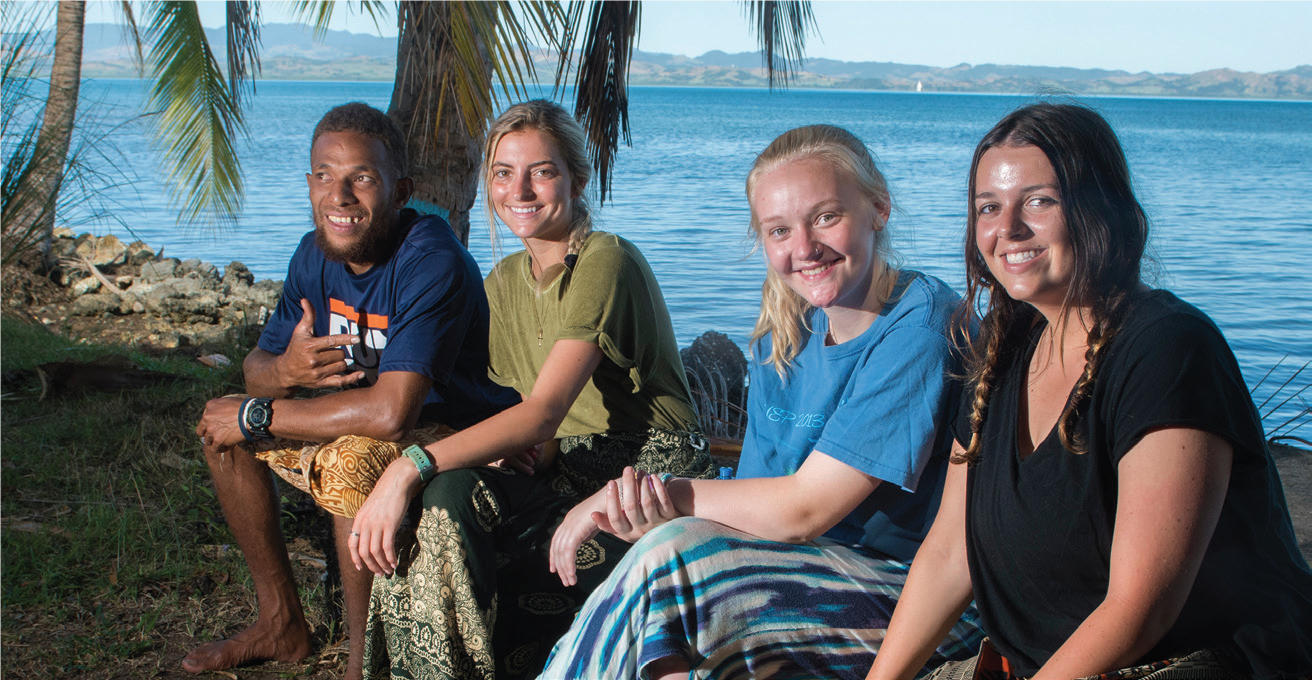
“We were just living this totally different life,” she says of her first trip. “It helped me learn to communicate with people from The College of Human Science’s Sustainability in Action trip leaves a mark on you very different cultures.”
That’s the most valuable thing she left with, she says — the skills to navigate social nuance 7,000 miles from Sky Bar. Like knowing not to show the tattoo to her homestay family when, like her friend Laura Vinzant ’19, she returned to Vorovoro a year later to help facilitate the 2019 Auburn trip as a Bridge the Gap intern. (The modesty-minded Mali can’t do much about the bikini-clad tourists who occasionally anchor illegally off the coast, but when Tui Mali adopts you as a daughter, it’s time to cover up.)
It’s not that she didn’t want to. You wind up closer to the folks you’re with during the “first-hand look into authentic island life,” as the Sustainability in Action website calls it, than anyone else you meet in Fiji. Three days in a Mali village, living with people who have hardly anything and still want to give it all to you? Vinzant’s host family had one bed. It was a pad. She got it.
It went the same for Turner. She spent her first night cuddled up with four kids on the home’s single mattress, waiting out a storm with…well, she doesn’t remember their names. To her, they’re still just Mom and Dad. And she couldn’t disappoint Mom and Dad.
“Mine is on my ribs,” she says. “I was like, ‘no, I can’t show you!’ But I’d just point to Laura’s arm because it’s the same tattoo.”
Vuvale — Fijian for family, literally “my home is your home.”
Sibley Barnette ‘18, a natural resources management graduate, and went to fight climate change on the shrinking shores of an island with no water source. But the four-inch outline of Vorovoro on her side isn’t a tribute to the environment—it’s an attempt to explain the experience, the sense of belonging.
At first, she’d planned to go with something about family, too. It seemed right. After three trips — one as a student, two as a Bridge the Gap intern — the place felt like home.
In the end, she kept the design but changed the words. There was just something in Tui Mali’s voice that one time, something in his eyes as he looked around at the eager young Americans working side by side with his people. It wasn’t a statement—it was a question.
“Rawa Va Cava?” — How can it be?
It was August 2010. Kate Thornton ’07, director of global education in Auburn University’s College of Human Sciences, needed a break from her dissertation. She turned on the BBC. There it was. “Paradise or Bust” was a five-part reality show about two British entrepreneurs who, in 2006, transplanted an online “tribe” onto a practically deserted island to establish what they claimed would be the most unique ecotourism experience in the world.
There would be buildings! There would be publicity!
Tui Mali said yes.
So did Thornton.
“I promised myself that if I ever finished the paper, I’d go there,” she says.
Four months later, she booked one of the last vacations to Vorovoro via Tribewanted.com. She was in love.
“A year later, I was a new member of the team in the College of Human Sciences and had an opportunity to write a grant for a new study abroad program,” Thornton says. “I was just like, ‘I have to take students back to that place.’”
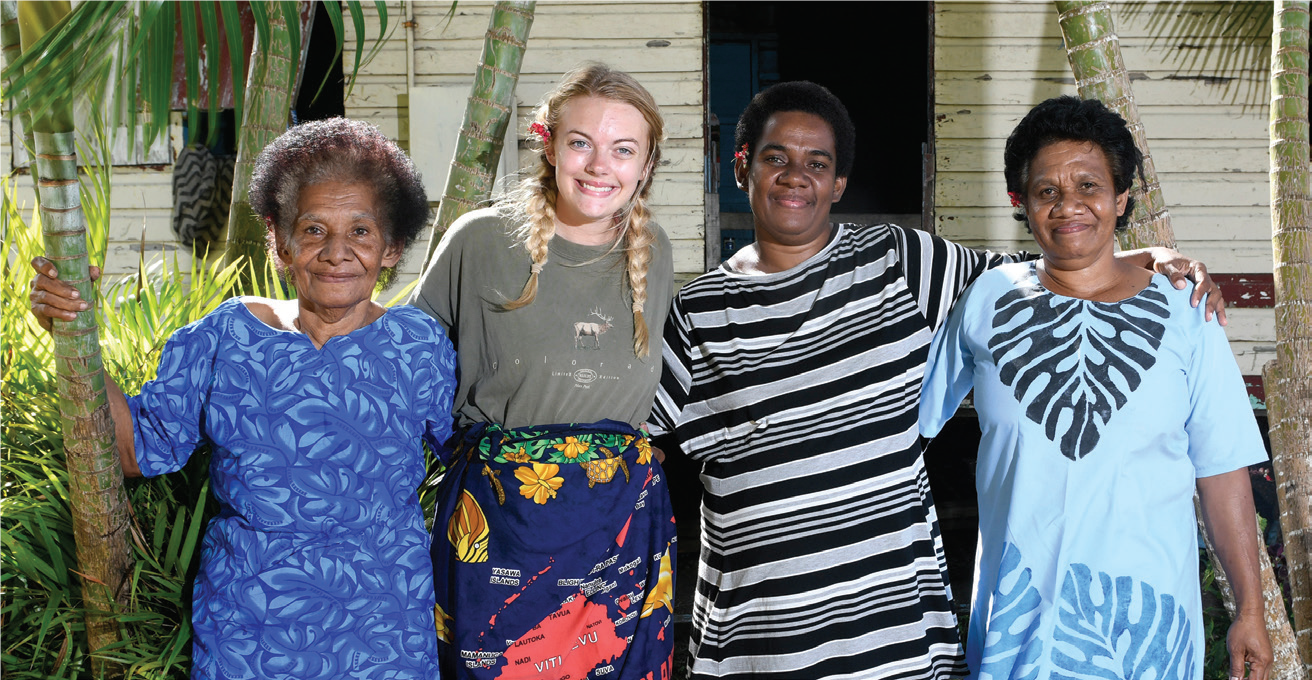
In 2009, Jenny Cahill’s family needed a vacation. She’d read about Tribewanted in one of the dozens of stories on the charming start-up experiment. It seemed perfect. She logged on, signed up for a month and wound up staying for 12, the company’s founder convincing her and her ex-husband to take over island operations for what turned out to be Tribewanted’s fourth and final year on Vorovoro. The work was fantastic. Until it wasn’t.
Bookings dried up. Buildings buckled. The Cahills and Tui Mali occasionally shared Vorovoro with just one or two backpackers for weeks at a time. Bad for business. Great for bonding.
“We fell in love with the [Mali] community,” Cahill says from her Indianapolis home, in between calls with marketing intern Natalie Jaroch, an Auburn global studies junior who took the Sustainability in Action trip last summer. “We thought we could use our relationships to create a visitor experience that was something truly sustainable.”
Exchange instead of escape. Partnership rather than ownership. Precious water. Precious jobs.
“That,” she says of the labor of love she began in 2012, “is the idea behind Bridge the Gap.” And, yes, “absolutely,” she says as director—without Auburn and Kate Thornton, the gap wouldn’t be bridged.
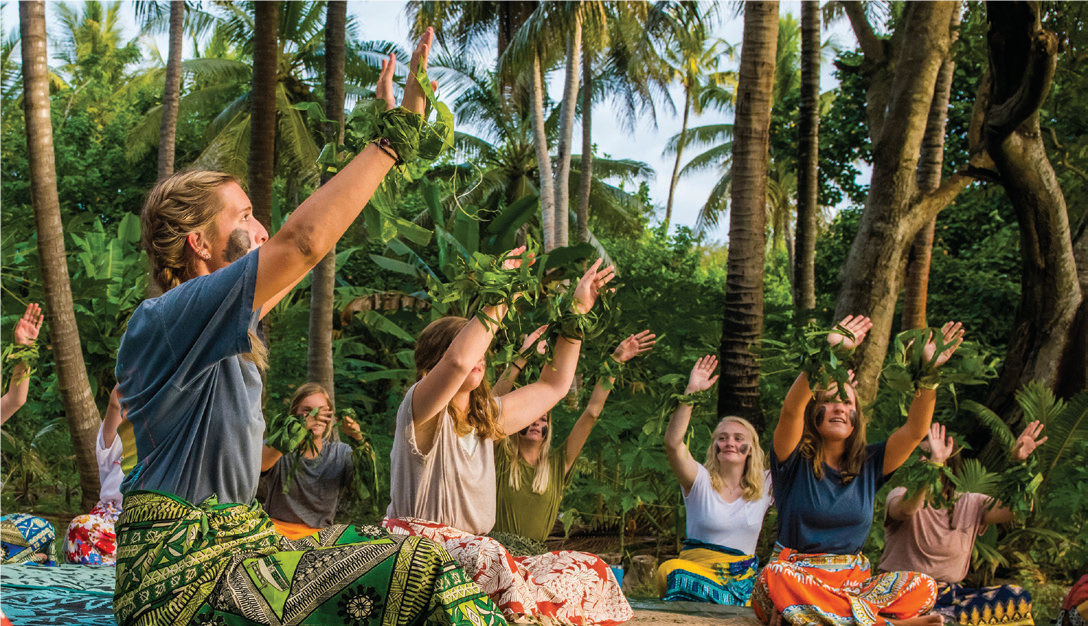
“We’ve essentially built this model,” Thornton says. “Some of the Fijians we work with don’t have high school educations, but they’re sharing their expertise and knowledge with American college students, which puts them in a place of honor instead of service.”
On Vorovoro, students don’t just learn about a different culture—by their very presence, they literally help preserve it.
Currently, the Fijian government strongly encourages tribal chiefs interested in maintaining autonomy on their land to demonstrate “development,” which typically involves names like Hilton and Marriott. But by virtue of Auburn’s educational initiatives, sustainability studies and collaborative community improvement projects, Vorovoro — to the delight of Melanesian archaeologists, who in 2010 proclaimed it the oldest inhabited piece of the Fijian archipelago — now legally qualifies as a cultural center (i.e., a development).
Through Bridge the Gap, Auburn is protecting the Mali tribe’s past by providing its members opportunities to improve their future. And now Auburn is showing other universities how to do the same.
After eight exclusive years with Auburn, Bridge the Gap and tribe members are facilitating similar programs with Arizona State University and Purdue University.
“I never would have been able to reach out to these other schools,” Cahill says, “without working with Auburn.”
Tui Mali nods, just as appreciative.
“When [Tribewanted] was here, it happened so quick, I thought maybe another one can come,” he says. “There were buildings, but all going down. When Auburn University come, they start building up.” “That,” he says, pointing toward his beloved grand bure, smiling, “is from Auburn.”
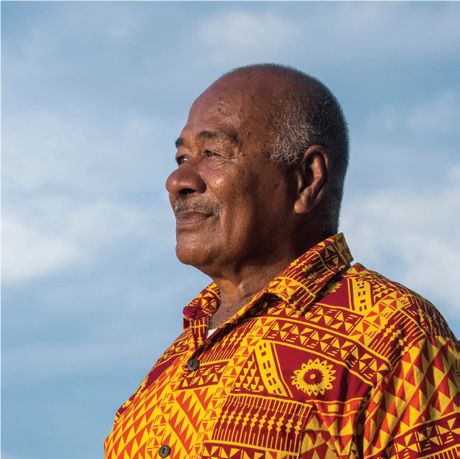
Sometimes the numbers don’t add up until the last day, during the goodbye song, or as everyone bawls as Bogi stands on the bow in his Fiji rugby shirt and leads a “War Eagle”, while little waving kids run after the boats along the shore. A few hours later, they’re at the five-star Fiji Marriott Resort Momi Bay for their first hot shower in forever. And everyone hates it.
They’re wasting water. They’re only watching the meke. They’re ordering kava from a menu.
The Sustainability in Action website calls it examining “the wealth of tourists versus the life of an average Fijian,” and it’s awful.
“(The resort) is in Nandi, where all the tourists go, and where there are lines people don’t really cross,” says Emily Strobaugh ’18, who graduated with degrees in global studies and English literature. Strobaugh went on the Sustainability in Action trip and interned at Cegu Valley Farms in 2017. “Native Fijians there are discouraged from talking to tourists…it was just so strange. I was like, ‘I don’t want to be here.’”
That’s when it sinks in. It’s not some kum ba yah cliché—on Vorovoro, it’s the solution to everything: 1 + 1 = 1.
Emily prefers it in Fijian: Dua Kei Na Dua Sa Dua. She got Tui Mali to write it down for her. She wanted it in his handwriting.
She didn’t wait till she got back to the states. On the day between the end of the study abroad and the start of her internship, she took the piece of paper to downtown Labasa, pointed to the back of her neck and told the tattoo artist “just like that.”
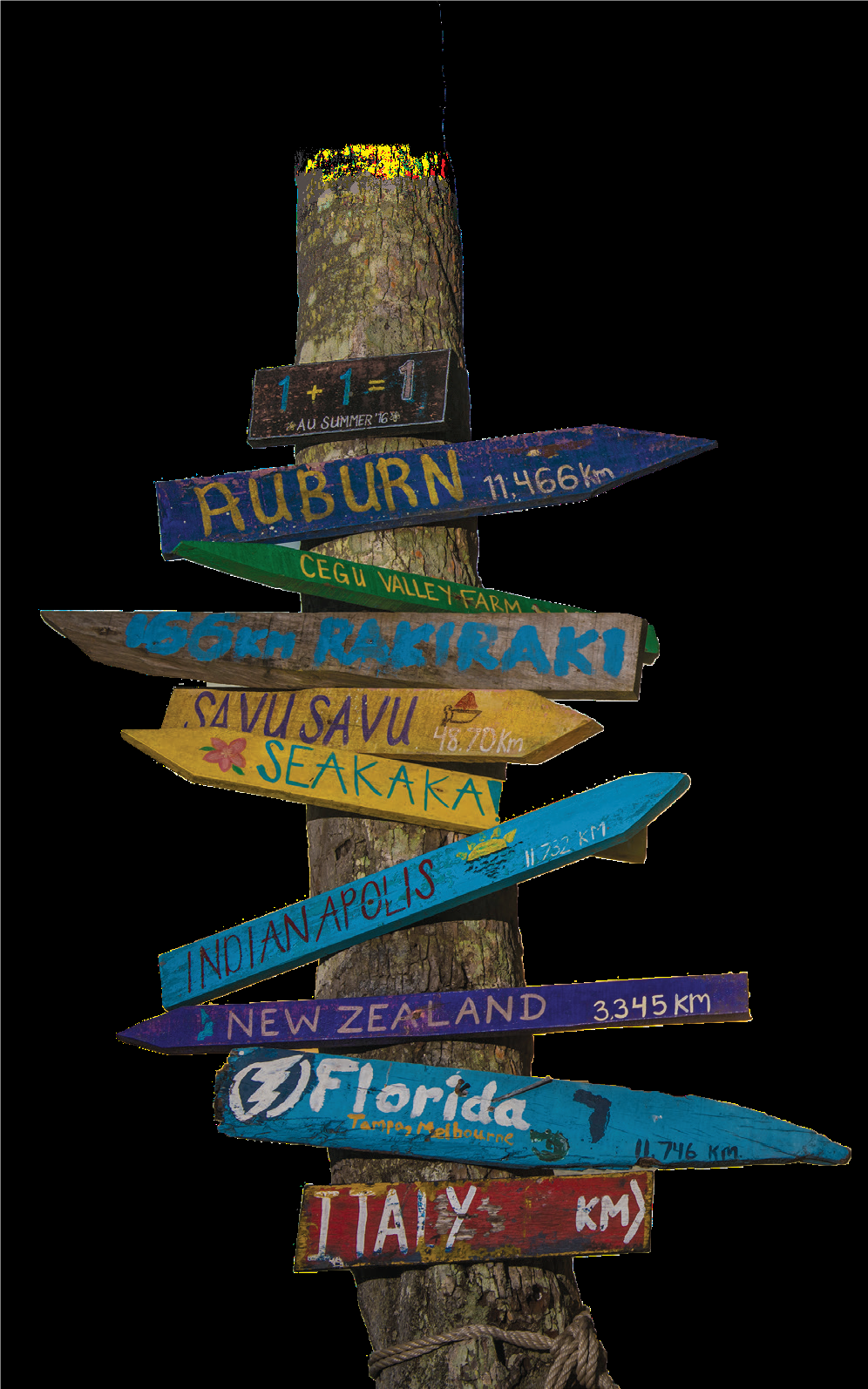
BIOMECHANICS AND ENGINEERING IN THE ARTS
People don’t typically associate engineering with the arts. Biomechanics and Engineering in the Arts is out to change that. Participants in this new study abroad offering from the Samuel Ginn College of Engineering head to Florence, Italy to learn the biomechanics, roots of ballet, opera, the symphony and even painting by exploring the lives and engineering influence of Leonardo Da Vinci and Giovanni Borelli, the father of biomechanics. eng.auburn.edu/global
JOSEPH S. BRUNO ITALY PROGRAM
You can’t talk Auburn study abroad options without mentioning the popular Joseph S. Bruno Italy program. Three months studying Italian art in a 15th-century palace in the Roman suburb of Ariccia? The College of Human Sciences tells students that their assignment is simple: “Experience everything.” By trip’s end, participants will have an international minor in human sciences. humsci.auburn.edu/global/studyabroad.php
SPAIN SEMESTER PROGRAM
Want to learn Spanish? Move to Spain. Students who take advantage of the College of Liberal Arts’ immersive Spain Semester Program in quaint Alcalá de Henares improve their language skills by living with host families on the outskirts of Madrid. Students study at the Universidad de Alcalá, which is located in a renovated 17th-century convent. cla.auburn.edu/forlang/study-abroad
THE ROLE OF FORESTS IN HUMAN LIVELIHOOD AND HEALTH IN AFRICA TRIP
A trip led by faculty in the College of Veterinary Medicine and the School of Forestry and Wildlife Sciences examines environmental health, public health, animal health and economic development in both South Africa and Madagascar. In addition to taking in stunning scenery, students pursue holistic, multidisciplinary solutions to problems that affect humans and animals. sfws.auburn.edu/student-life/study-abroad
An Eye for Action
From the mound to the mountain, Blake Gordon ’03 has captured life on the edge.
Charting Her Course
From Auburn’s campus to the world’s most advanced warships, Emily Curran ’10 has never forgotten where she found her footing.
Building a Brand, Cultivating a Community
A fashion emergency and a social media surge helped Kayla Jones ’18 launch her brand Women With Ballz.
An Eye for Action
From the mound to the mountain, Blake Gordon ’03 has captured life on the edge.
Charting Her Course
From Auburn’s campus to the world’s most advanced warships, Emily Curran ’10 has never forgotten where she found her footing.
Building a Brand, Cultivating a Community
A fashion emergency and a social media surge helped Kayla Jones ’18 launch her brand Women With Ballz.


